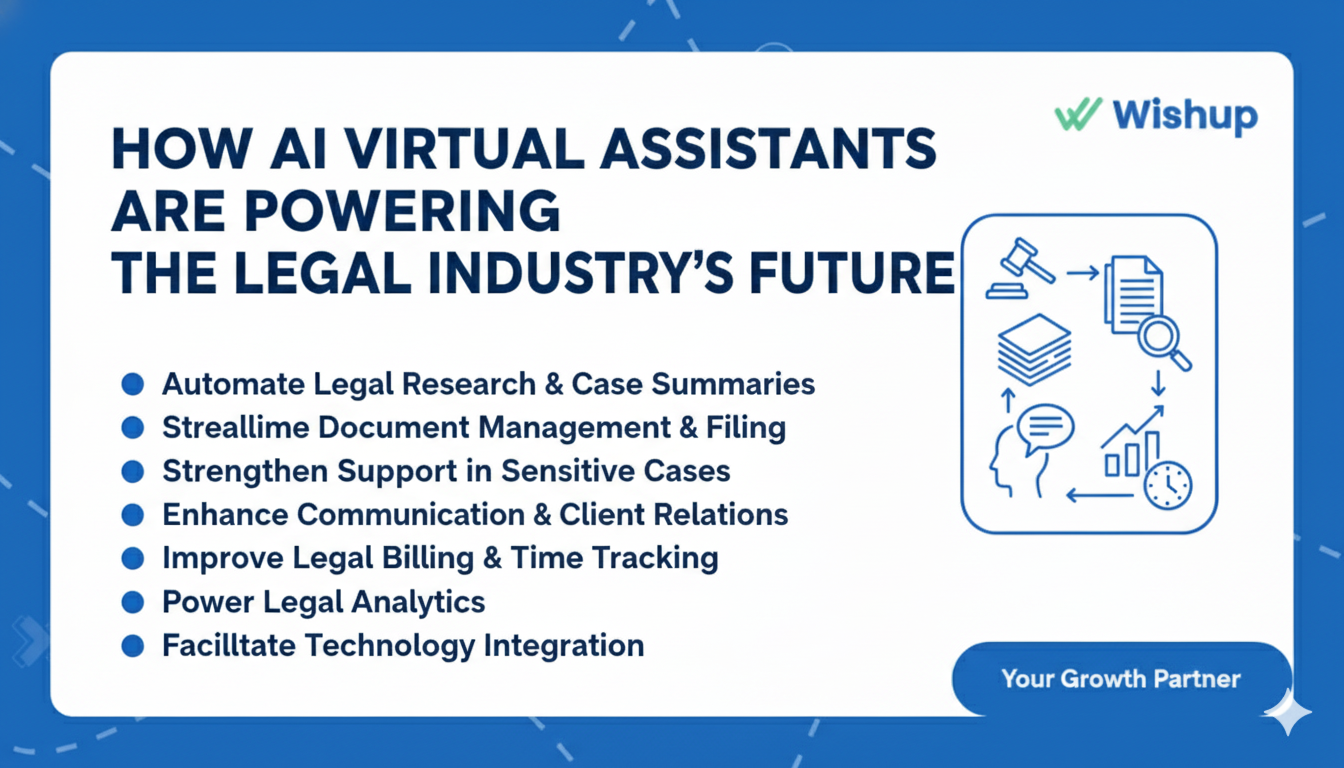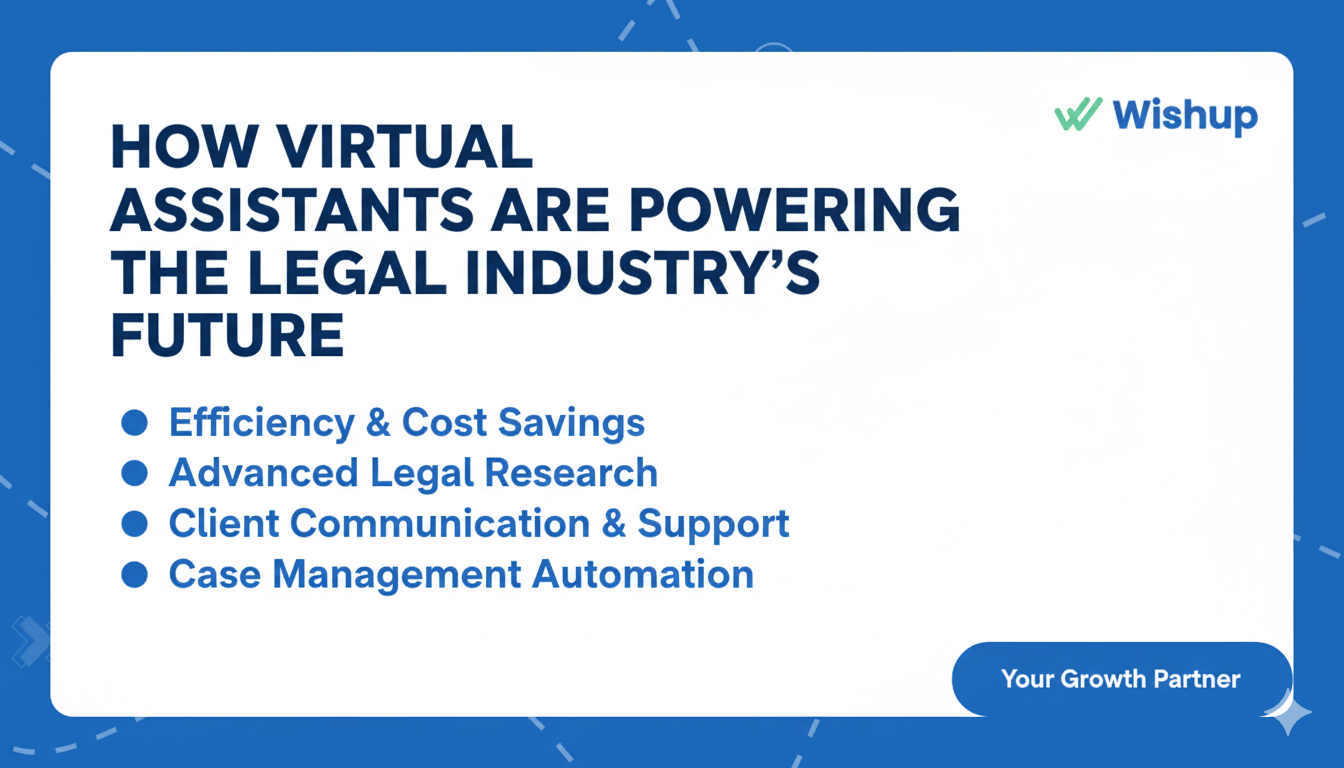The legal sector is experiencing a significant shift as technology redefines traditional law firm operations. Virtual assistants are leading this change by improving efficiency, streamlining workflows, and enhancing client communication.
A report from Goldman Sachs indicates that AI may handle nearly 44 percent of tasks in the legal field in the near future. This figure far exceeds the general average across all industries, which stands at 25 percent.
By combining human expertise with AI-powered virtual assistants, law firms can manage complex cases faster and maintain accuracy. This strategy enables law firms to remain competitive as technology continues to reshape the legal field.
In this article, we examine the ways virtual assistants are leading this shift and redefining how legal work is managed.
Automate Legal Research and Case Summaries
Legal research is the backbone of every case, but it is also one of the most time-consuming tasks for attorneys. AI-powered virtual assistants are transforming this process by automating repetitive steps like scanning case law, statutes, and legal opinions.
Instead of manually reviewing hundreds of documents, lawyers can now rely on these tools to identify relevant precedents and extract key insights. They also summarize findings with remarkable accuracy, saving time and improving efficiency.
These assistants can categorize information by jurisdiction, relevance, and argument strength, which cuts research time while improving precision. According to Legal Dive, 73% of lawyers plan to use generative AI in legal industry and their work. Even more promising, 68% feel prepared for its impact, and 73% already understand how modern AI tools can enhance their research and case preparation.
By automating legal research, virtual assistants empower firms to handle larger caseloads efficiently, minimize oversight, and make data-backed arguments with confidence.
Streamline Document Management and Filing
A Thomson Reuters report shows that 77 percent of legal professionals use AI for document review and 74 percent for legal research. The same percentage, 74 percent, employ AI to summarize documents, while 59 percent use it to draft briefs or memos.
Managing legal documents and filings is a critical but time-consuming part of any law firm’s workflow. Virtual assistants help streamline this process by organizing digital files, handling e-filing systems, and ensuring compliance with court protocols.
AI-driven tools help organize, summarize, and monitor documents, allowing attorneys to retrieve information faster and more precisely. Utilizing virtual assistants enables law firms to minimize mistakes, save valuable time, and enhance overall efficiency in managing their legal documents. To ensure these tools remain accurate, reliable, and compliant with legal standards, regular LLM evaluation helps law firms assess performance quality and reduce the risk of errors in document handling.
Strengthen Support in High-Profile and Sensitive Cases
Handling high-profile or sensitive legal cases requires meticulous organization and strict confidentiality. AI-assisted virtual assistants play a crucial role by assisting with large-scale document organization, data handling, and case coordination. For example, in the sensitive Illinois juvenile detention center lawsuit, these VAs can help manage records, organize testimonies, and keep sensitive data secure.
TorHoerman Law reports that more than 200 former youth inmates have initiated legal action against Illinois youth detention centers. The plaintiffs claim they experienced sexual abuse while in state custody. A significant number of these cases involve misconduct by chaplains, correctional officers, and medical personnel, with incidents occurring over many decades.
In such sensitive matters, maintaining confidentiality is essential. AI virtual assistants can support by securely handling documents, tracking case files, and managing communication internally. This ensures survivors’ information is protected while the legal team works efficiently.

Enhance Communication and Client Relations
ResearchGate reports that gaining a new client can be 5-25 times more expensive than retaining an existing one. Even a modest 5 percent increase in client retention can raise profits by 25 to 95 percent. These numbers emphasize the vital role of maintaining strong client relationships and clear communication in law firms.
AI virtual assistants can help law firms achieve this by managing client correspondence, scheduling meetings, sending reminders, and providing timely case updates. They can also track follow-ups, prepare personalized messages, and maintain communication logs to ensure no client inquiry is missed. For intake and scheduling workflows, many teams also evaluate Chili Piper alternatives to route leads efficiently and reduce no-shows.
By keeping clients informed, engaged, and supported throughout their legal journey, automated VAs allow attorneys to focus on strategy. This approach also strengthens trust, client satisfaction, and long-term retention.
Improve Legal Billing and Time Tracking Accuracy
Precise billing and time management are crucial for law firms to ensure both profitability and client transparency. AI-powered virtual assistants contribute significantly by tracking billable hours, logging work activities, and producing accurate invoices efficiently. They can also reconcile client payments, flag discrepancies, and ensure that all work is properly accounted for.
By automating these tasks, they reduce errors, save administrative time, and allow attorneys to focus on legal work rather than back-office processes. This results in smoother financial operations, improved client trust, and a more efficient workflow for the entire firm.
Power Legal Analytics and Technology Integration
AI virtual assistants help law firms leverage legal analytics by organizing case data, tracking key performance metrics, and identifying patterns across past cases. They can generate reports on billable hours, case durations, and client outcomes, providing actionable insights for better decision-making.
Additionally, smart VAs assist in integrating new legal technologies, such as AI research tools, document management systems, and automated workflow software. They ensure these tools are implemented smoothly and efficiently. To maximize efficiency, it’s important to focus on refining enterprise search processes, ensuring data is well-structured and accessible for optimal retrieval accuracy.
By supporting both analytics and technology integration, AI-powered virtual assistants enable law firms to make data-driven decisions, streamline operations, and optimize resource allocation.
Frequently Asked Questions
How do intelligent virtual assistants maintain confidentiality in legal environments?
These AI assistants protect sensitive information through encrypted communication, secure cloud storage, and access-controlled systems. They follow strict privacy protocols and monitor file access, ensuring that all client data and legal documents are only accessible to authorized personnel.
Can automated legal assistants interact directly with clients, or do they only support lawyers?
While their primary function is to assist lawyers with administrative tasks, document management, and scheduling, AI assistants can also manage routine client interactions. This includes appointment reminders, status updates, and basic inquiries, always under attorney supervision to maintain professionalism and confidentiality.
What legal tasks are not suitable for delegation to AI virtual assistants?
AI or automated legal assistants should not handle tasks requiring professional legal judgment, such as providing legal advice or making strategic case decisions. They also should not finalize or authorize legal documents, which must be executed by a licensed attorney. Their role is limited to research, administrative support, and document handling under attorney guidance to ensure compliance and accuracy.
Legal Innovation Through AI-Powered Virtual Assistants
AI-powered virtual legal assistants are reshaping the legal sector by enhancing efficiency, accuracy, and client satisfaction. These intelligent tools automate research, organize case documents, and support sensitive matters, allowing attorneys to concentrate on high-value strategic work. They also streamline billing, monitor time, and integrate advanced analytics seamlessly.
By combining human expertise with AI capabilities, law firms can manage larger caseloads, ensure confidentiality, strengthen client relationships, and optimize daily operations. As AI technology continues to advance, these virtual assistants will become an essential component in driving innovation and shaping the future of legal practice.

